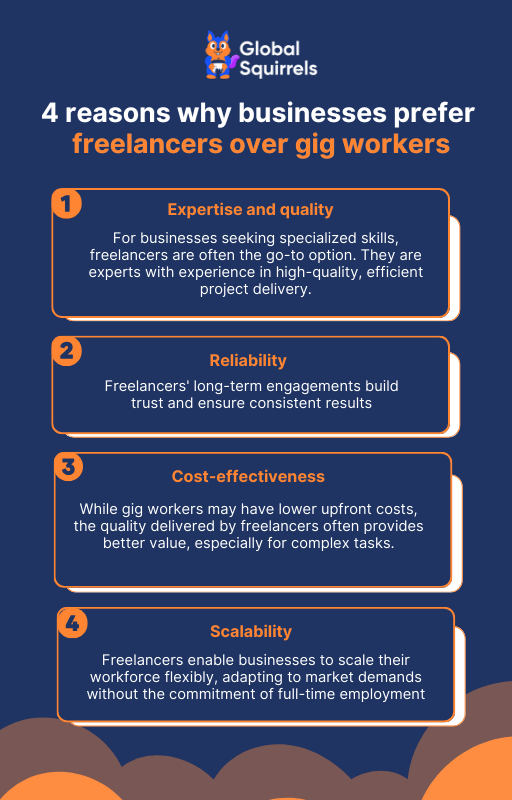Gig worker vs Freelancer: which one is right for your business?

Traditional employment models are being replaced by more flexible arrangements for the way the modern workplace is evolving. Two prominent figures in this shift are freelancers and gig workers. Often used interchangeably, these terms do actually have different meanings with huge implications for businesses. This blog post will delve into the key differences in the gig worker vs freelancer debate, explore the advantages and disadvantages of each, and ultimately help you determine which model best suits your business needs.
Who are gig workers and freelancers?
Gig workers and freelancers are both part of the growing gig economy, but they aren’t exactly the same.
Gig workers usually take on short-term or one-time jobs through platforms like Uber, DoorDash, or TaskRabbit. These jobs are often task-based and can be done on demand. For example, a gig worker might deliver food, drive people around, or help with small jobs like assembling furniture. They don’t usually negotiate prices or choose their clients—they accept tasks offered by an app or platform.
Freelancers, on the other hand, are self-employed professionals who offer services directly to clients. They often work in fields like writing, design, software development, or marketing. Freelancers set their own rates, choose who they work with, and manage multiple projects at a time.
In short:
-
Gig workers do quick, task-based jobs through apps.
-
Freelancers offer specialized services directly to clients and usually have more control over their work.
Both play important roles in today’s flexible workforce, and choosing between the two depends on the type of work and level of independence someone wants.
What is a gig economy?
Short-term contract or freelance work is the hallmark of such an economic system as the gig economy. Companies hire gig workers for temporary roles facilitated through online platforms and apps. However, the term was first used to refer to musicians’ performances, and today, it also describes various task-based jobs.
Key characteristics of the gig economy include:
- Flexibility: Workers can select the tasks and set their schedule.
- Independence: Gig workers manage their expenses and taxes without employer oversight.
- Task-based compensation: Income is dependent on individual tasks or projects; therefore, payment is variable.
Gig workers, often working on platforms such as ride-hailing apps or food delivery services, enjoy flexibility and independence, appealing to millennials. In comparison, freelancers are often writers, graphic designers, and software developers. However, this growth comes with challenges, including a lack of work-related benefits and income security, with 25% of gig workers expressing dissatisfaction in these areas. There is a shift in which employers can tap into specialized skills when they need them and pay less for recruitment and training. Nevertheless, policymakers have to straddle the innovation versus fair labor balance to get the most out of the economics and the protection of workers.
Major differences between freelancers and gig workers
Freelancers and gig workers are both vital components of the modern workforce, but they operate under distinct frameworks. Understanding the differences between gig workers vs freelancers is crucial for businesses looking to hire talent that aligns with their goals.
Definitions & work structure
Freelancers are self-employed professionals who offer specialized services on a project basis. A lot of the time, they build long-term relationships with clients, create a personal brand, and control their work, such as selecting clients and negotiating the terms.
Gig workers, in contrast, typically handle short-term tasks or projects facilitated through digital platforms. However, since assignments are typically set by the platform’s rules and structures for pricing, they have little control over them.
Control over work
Freelancers enjoy autonomy, choosing clients and projects, and negotiating rates. Gig workers must adhere to the platform’s rules, offering limited flexibility.
Nature of engagement
Freelancers often engage in long-term contracts, fostering trust and reliability. Gig workers usually handle one-off tasks, resulting in transactional relationships.
Specialization and skill level
Freelancers bring specialized skills (e.g., graphic design or writing), which make them valuable for complex projects. Gig workers typically perform general tasks requiring minimal training.
Income stability
Freelancers can build steady income streams through repeat clients and higher rates. Gig workers face fluctuating earnings due to the unpredictable nature of gigs.
Are there any challenges faced when working with freelancers?
Cost of wire transfers
Thanks to the costs associated with paying offshore freelancers via wire transfers, the average is around $75 per transaction. For a business of 10 freelancers, that is an additional $750 a month, plus exchange rate margins and the administrative time to process payments. Recurring expenses hurt budgets, waste resources, and cause inefficiencies in many ways. Also, for accounting and HR teams, tax withholding management, which is the obligation to make payments for freelancers on time, is a complicated and consuming task. These delays or errors can cause freelancers to be dissatisfied with your projects, which will hurt their performance and commitment to your projects. Together, these challenges illustrate the demand for simple, cost-effective ways to efficiently manage freelancer payments.
Errors with W-8BEN compliance risk
Fast forward to managing W-8BEN forms for global freelancers, and you quickly have a compliance nightmare. Incomplete or incorrect submissions put you and your freelancer at risk of unexpected withholding taxes and IRS non-compliance penalties. Worse, you fail to take advantage of valuable tax treaty benefits that would help significantly reduce applicable tax rates without the W-8BEN. It becomes a critical challenge for your business, creating legal, financial, and operational risks and making a simple form a complex challenge. While proper submission and accuracy are non-negotiable, obtaining that without dedicated support can be a troublesome task.
Related read: Form 1099-NEC vs 1099-MISC: How to file them
Lack of commitment
Unlike employees bound by long-term contracts or exclusivity agreements, freelancers can quit at any time, and thus, you will lose the time and resources invested in training them. Moreover, freelancers often deal with several clients and then bill you for the full-time workload while working on your project intermittently. This can result in delays, inconsistent quality, and misaligned expectations. To stabilize delivery and retain trained talent, many teams hire virtual assistants through managed platforms that provide continuity, oversight, and scalable support. But then it can get challenging to make sure freelancers remain focused and committed to your project without formal agreements, and it is a bit of a chore to keep track of their involvement.
Inability to track the freelancer’s progress
Tracking progress from other countries or different time zones is one of the biggest challenges when working with freelancers. Managers find it hard to have timely productivity without an effective system to monitor task completion. As a result, there is a lack of visibility, resulting in accountability gaps and project final deadlines. This makes smooth operations challenging to keep up, and businesses miss timelines and are interrupted in their workflow. These challenges emphasize the requirement for a dependable tracking mechanism that will monitor the tasks, keep on schedule, and hold people accountable even on different sides of the geographic or time zones. Without it, managing freelancers can quickly become a time-consuming and inefficient process and ultimately impact the business’s overall performance.
Hire and manage freelancers with our Orange and Purple plans
Global Squirrels is a staffing and payrolling platform that helps you hire and manage your freelancers globally. As an Employer of Record (EOR), our platform ensures compliance with local and international tax & labor laws, timely payments, task and timesheet management, freelance contracts, and performance monitoring. Let us have a look at how our platform helps you navigate these challenges.
- Our platform also offers a secure payment system for freelancers processed through a federally regulated Electronic network. Global Squirrels makes sure payments are accurate and do not leave out any significant bits, like tax details.
- Global Squirrels makes sure you are on the safe side of the law, take care of non-compliance, and pay attention to local and international labor and tax regulations. Managing the W-8BEN form for a freelance hired is key. With our platform, we make the process easy and fast, and we get you to hire freelancers who meet all your requirements without any hassles.
- Global Squirrels ensures the freelancers you partner with are fully dedicated to your business. That is made possible with our freelancer hiring plans that require freelancers to sign an agreement including exclusivity clauses.
- The productivity gains continue with our task management tools, which allow managers to assign one-time and recurring tasks, along with deadlines that automatically integrate into timesheets for monitoring. Both managers and freelancers get an immediate view of task progress and can keep projects on schedule.
Here is what Global Squirrels offers to help you meet all your requirements.
Purple plan
The Purple Plan is intended for businesses that already have a freelancer in mind. Once the onboarding process begins, our platform handles all administrative tasks, ensuring smooth operations. This includes timely and accurate payments, performance monitoring, task and timesheet management, maintaining compliance with local and international laws, and managing freelance contracts.
Orange plan
The Orange Plan helps you find and hire the top freelancer based on your job requirements. This means you will have all the control over the hiring process, from the job title, description, budget, skills, educational background, and countries you want to hire from. When you enter this information, you will get pre-screened and background-checked profiles in 2 to 5 working days. Then, you can choose who to interview and who you want to onboard as freelancers. As per the above, we make our platform handle all HR related functions mentioned above.
Are you ready to work with a freelancer? Get a demo today!

